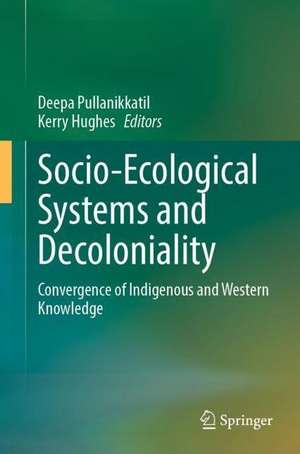Socio-Ecological Systems and Decoloniality: Convergence of Indigenous and Western Knowledge
Editat de Deepa Pullanikkatil, Kerry Hughesen Limba Engleză Hardback – 2 ian 2023
| Toate formatele și edițiile | Preț | Express |
|---|---|---|
| Paperback (1) | 785.24 lei 6-8 săpt. | |
| Springer International Publishing – 3 ian 2024 | 785.24 lei 6-8 săpt. | |
| Hardback (1) | 791.40 lei 6-8 săpt. | |
| Springer International Publishing – 2 ian 2023 | 791.40 lei 6-8 săpt. |
Preț: 791.40 lei
Preț vechi: 965.12 lei
-18% Nou
Puncte Express: 1187
Preț estimativ în valută:
151.45€ • 164.46$ • 127.22£
151.45€ • 164.46$ • 127.22£
Carte tipărită la comandă
Livrare economică 23 aprilie-07 mai
Preluare comenzi: 021 569.72.76
Specificații
ISBN-13: 9783031150968
ISBN-10: 3031150961
Pagini: 363
Ilustrații: XVII, 363 p. 53 illus., 42 illus. in color.
Dimensiuni: 155 x 235 mm
Greutate: 0.71 kg
Ediția:1st ed. 2022
Editura: Springer International Publishing
Colecția Springer
Locul publicării:Cham, Switzerland
ISBN-10: 3031150961
Pagini: 363
Ilustrații: XVII, 363 p. 53 illus., 42 illus. in color.
Dimensiuni: 155 x 235 mm
Greutate: 0.71 kg
Ediția:1st ed. 2022
Editura: Springer International Publishing
Colecția Springer
Locul publicării:Cham, Switzerland
Cuprins
Chapter1. Introduction.- Chapter2. Scientific and Indigenous Knowledge for Socio-Ecological Systems: A 20-Year Global Bibliometric Analysis.- Chapter3. Interfacing indigenous knowledge with scientific knowledge for improved health outcomes: A case of Eswatini.- Chapter4. Indigenous Ways of Predicting Agricultural Droughts in Zimbabwe.- Chapter5. Kusintha kwa nyengo: local meanings of climate change in Malawi.- Chapter6. Unravelling indigenous knowledge using the Msangu (Faidherbia albida) tree in Malawi: through the voice of farmers.- Chapter7. Traditional Early Warning Signals for Floods and Drought in Nsanje and Chikhwawa Districts, Malawi.- Chapter8. Conservation of Natural Forests through Indigenous Religious Beliefs and Practices: A Case Study of M’bona Cult, Nsanje District, Malawi.- Chapter9. Cross-scale properties and adaptive management of indigenous residual moisture crop cultivation systems in Malawi.- Chapter10. Indigenous Knowledge and Practice Related to Health, Nutrition and Environments in Bangladesh.- Chapter11. Assessment of Knowledge and Attitudes of Pastoralists towards Tsetse flies and Trypanosomiasis in the Maasai Steppe, Northern Tanzania.- Chapter12. Shortage, meanings, and adaptations of water: Reflections on the perspectives elders from San José Lachiguirí Oaxaca, Mexico.- Chapter13. North American case studies of medicinal plant conservation.- Chapter14. Contested understanding of river health from communities’ perspective in the Lower Komati River in South Africa.- Chapter15. Awajun and Ginger: Introduced Species Becoming Important Traditional Medicines.- Chapter16. Overview of Brazilian Biodiversity Law and Identification of Legal Instruments and Strategies for Effective Participation of Traditional Communities in exporting and other commercial opportunities related to biodiversity assets.- Chapter17. Lessons learnt.
Notă biografică
Dr. Deepa Pullanikkatil is a Civil Engineer turned Environmental Scientist, with a PhD in Environmental Science and over 20 years of work experience. She is founder of a small non-profit organization “Abundance” based in Malawi and is Co-Director of the Sustainable Futures Global Network which brings together researchers, practitioners, and communities to address the common goal of a sustainable and equitable world.
Dr. Kerry Hughes is an Ethnobotanist, Herbalist and Author with a 20-year record-of-success in natural product development. She works at the nexus of market opportunity identification, innovative product formulation, and global natural product ingredient development.
Dr. Kerry Hughes is an Ethnobotanist, Herbalist and Author with a 20-year record-of-success in natural product development. She works at the nexus of market opportunity identification, innovative product formulation, and global natural product ingredient development.
Textul de pe ultima copertă
This contributed volume provides case studies from around the world that feature a convergence of indigenous and western knowledge in an attempt to understand complex socio-ecological systems. The book provides an understanding of socio-ecological systems in an ethical space using a 'Decoloniality' approach (i.e. untangling the production of knowledge from a primarily Eurocentric episteme). The work presented here integrates and merges indigenous knowledge with western science, thereby building on the strengths of each in service of understanding these systems. The editors of this volume approach indigenous communities and scientists as equal knowledge-holders and, in doing so, contributes towards improved understanding of socio-ecological systems and interactions in cross-cultural contexts. This volume will be of interest to scientists, instructors, students and policy makers across disciplines such as environmental sciences, social sciences, interdisciplinary studies, cultural studies, ethnobotany, anthropology and plant genetic resources.
Caracteristici
Contributes towards improved knowledge of socio-ecological systems and interactions in cross-cultural contexts Provides a platform for indigenous knowledge to be seen as essential knowledge in environmental sustainability Presents case studies from around the world with a convergence of indigenous and modern knowledge
